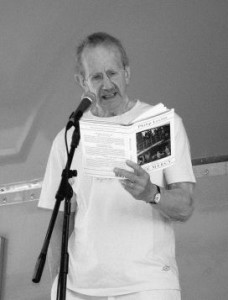 Detroit-born and raised, and self-described anarchist, Philip Levine was named the U.S. Poet Laureate by the Library of Congress in August. The post, whose task entails raising “the national consciousness to a greater appreciation of the reading and writing of poetry,” may take on a different than usual dimension during Levine’s tenure given his politics.
Detroit-born and raised, and self-described anarchist, Philip Levine was named the U.S. Poet Laureate by the Library of Congress in August. The post, whose task entails raising “the national consciousness to a greater appreciation of the reading and writing of poetry,” may take on a different than usual dimension during Levine’s tenure given his politics.
Levine’s many poetry books are flying off bookstore shelves, in which readers will encounter poems about working class Detroit where Levine worked building transmissions at a Cadillac plant, plus others about anarchists in Spain such as the one on this page. In interviews, Levine talks about being drawn towards anarchism because of an affinity with the Spanish Revolution. He has written about modern Spanish poets such as Antonio Machado and Garcia Lorca, but also anti-fascist anarchist militia leaders like Buenaventura Durruti and Francisco Ascaso.
The post of laureate, which runs only from October to May, is mostly ceremonial but draws public attention to the author’s work. The designate is chosen by the Library through consultation, in part, with the current laureate, who was W. S. Merwin, an engaged Buddhist and 1960s anti-war activist.
In describing his works, which earlier were often “gritty, hard-nosed evocations of the lives of working people and their neighborhoods,” Levine says his poems have softened somewhat. He told The New York Times, “I find more energy in my earlier work. More dash, more anger. Anger was a major engine in my poetry then. It’s been replaced by irony, I guess, and by love.”
Levine, now 83, has numerous books in print. His volume, The Simple Truth, won the Pulitzer Prize in 1995.
On the Murder of Lieutenant Jose Del Castillo
By the Falangist Bravo Martinez, July 12, 1936
When the Lieutenant of the Guardia de Asalto
heard the automatic go off, he turned
and took the second shot just above
the sternum, the third tore away
the right shoulder of his uniform,
the fourth perforated his cheek. As he
slid out of his comrade’s hold
toward the gray cement of the Ramblas
he lost count and knew only
that he would not die and that the blue sky
smudged with clouds was not heaven
for heaven was nowhere and in his eyes
slowly filling with their own light.
The pigeons that spotted the cold floor
of Barcelona rose as he sank below
the waves of silence crashing
on the far shores of his legs, growing
faint and watery. His hands opened
a last time to receive the benedictions
of automobile exhaust and rain
and the rain of soot. His mouth,
that would never again say “I am afraid,”
closed on nothing. The old grandfather
hawking daisies at his stand pressed
a handkerchief against his lips
and turned his eyes away before they held
the eyes of a gunman. The shepherd dogs
on sale howled in their cages
and turned in circles. There is more
to be said, but by someone who has suffered
and died for his sister the earth
and his brothers the beasts and the trees.
The Lieutenant can hear it, the prayer
that comes on the voices of water, today
or yesterday, from Chicago or Valladolid,
and hands like smoke above this street
he won’t walk as a man ever again.
What do you mean when you say you’re an anarchist?
If you’re going to allow people to make all the important choices about their lives you’re going to be relying on them to make decent choices. If people are going to make unwise and disgusting choices that tyrannize their brothers and sisters, then they have violated a profound anarchist tenet: you don’t tyrannize other people. In accepting your own freedom you have to grant others theirs. One basis of anarchism is the appalling confidence people will act decently.
— Philip Levine, from an interview with David Remnick (Michigan Quarterly Review [1980]).
